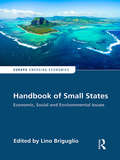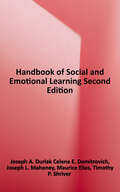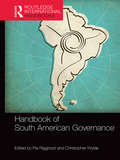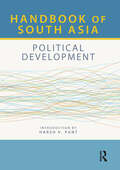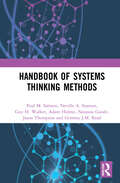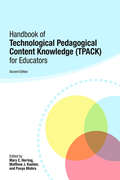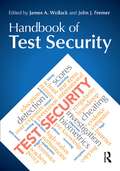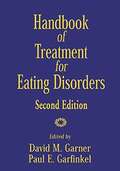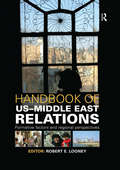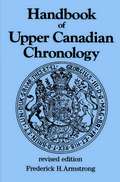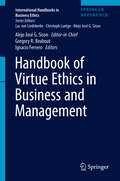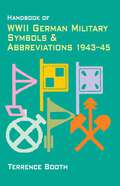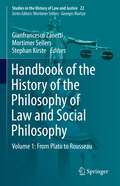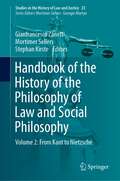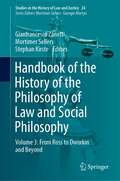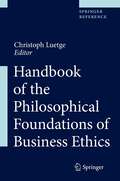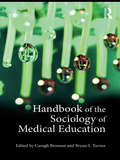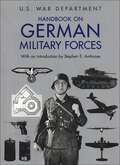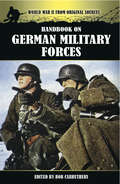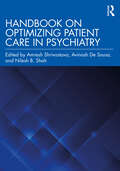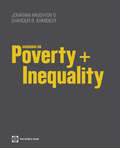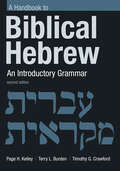- Table View
- List View
Handbook of Small States: Economic, Social and Environmental Issues (Europa Perspectives: Emerging Economies)
by Lino BriguglioThis handbook covers a wide spectrum of issues relating to small states. Chapters in the volume have been grouped under the three main themes of economic, social and environmental issues. The economics sections include chapters dealing with trade, finance and regulatory frameworks, while the social theme covers health, migration, population ageing, as well as overall social wellbeing. The environmental theme examines matters such as measuring environmental performance, natural disasters, the ocean economy, and the validity of the Sustainable Development Goals. One major issue is the definition of small states. As this volume demonstrates, generally speaking, population is used to measure country size in the literature. However, it clearly emerges that there is no real consensus as to the population cut-off point that distinguishes small states from large ones. While the approaches taken by the authors vary, in all cases the chapters draw practical policy implications for small states. The book can therefore be considered as a wide-ranging depositary of information on small states with the aim of deriving policy prescriptions, and thus as an excellent resource for academics, students and policymakers.
Handbook of Social and Emotional Learning, 2nd Edition
by Celene E. Domitrovich Joseph A. Durlak Joseph L. MahoneyThe definitive work on social and emotional learning (SEL) research and practice is now in an extensively revised second edition, featuring all new and thoroughly updated chapters. The world’s leading SEL scholars describe state-of-the-art interventions that build students' competencies for managing emotions, showing empathy for others, forming supportive relationships, and making responsible decisions. The scientific underpinnings of SEL are explored and its impact on academic achievement and behavior is examined. The Handbook discusses ways to assess SEL and design effective, developmentally and culturally informed programs for students in preschool through secondary school settings and beyond. New to This Edition *Reflects a decade of significant advances in research, policy, and implementation. *New and expanded topics--equity, culturally responsive practice, multi-tiered systems of support, adult SEL, technology tools and applications, mental health, scaling up successful interventions, and more. *Six chapters on international SEL efforts, discussing both developed and developing countries. *Every chapter concludes with Key Takeaway Points.
Handbook of South American Governance (Routledge International Handbooks)
by Christopher Wylde Pia RiggirozziGovernance in South America is signified by strategies pursued by state and non-state actors directed to enhancing (some aspect of) their capabilities and powers of agency. It is about the spaces and the practices available, demanded or created to ‘make politics happen’. This framework lends explanatory power to understand how governance has been defined and practiced in South America. Pía Riggirozzi and Christopher Wylde bring together leading experts to explore what demands and dilemmas have shaped understanding and practice of governance in South America in and across the region. The Handbook suggests that governance dilemmas of inequitable and unfulfilled political economic governance in South America have been constant historical features, yet addressed and negotiated in different ways. Building from an introduction to key issues defining governance in South America, this Handbook proceeds to examine institutions, actors and practices in governance focusing on three core processes: evolution of socio-economic and political justice claims as central to the demands of governance; governance frameworks foregrounding particular issues and often privileging particular forms of political practice; and iterative and cumulative processes leading to new demands of governance addressing recognition and identity politics. This Handbook will be a key reference for those concerned with the study of South America, South American political economy, regional governance, and the politics of development.
Handbook of South Asia: Political Development
This Handbook brings together essays that introduce the reader to the key issues in South Asian political development. Written by experts in their respective areas, the essays explore key aspects of political economy, political and economic change, and the complex diplomatic and security challenges of individual countries and the region as a whole. Essays discuss topics as wide-ranging as China’s growing reach in South Asia, political Islam, SAARC and water politics through the region. This well-researched Handbook is an essential reference tool for students and scholars of Political Science, International Relations and South Asian studies.With an introduction by Harsh V Pant.
Handbook of Systems Thinking Methods
by Jason Thompson Neville A. Stanton Guy H. Walker Paul M. Salmon Natassia Goode Adam Hulme Gemma J.M. ReadThe systems thinking philosophy has become popular in human factors and ergonomics and safety science. These methods are being used to understand and resolve complex societal problems in areas such as transport safety, workplace safety, medication error, disaster management, child abuse, financial crises, terrorism, climate change and public health and wellbeing. This handbook presents practical step-by-step guidance for practitioners and researchers wishing to use these methods to tackle complex problems. Each method includes an example case study which demonstrates how the method can be applied and how the results can be interpreted and translated into practical recommendations. The book presents practical guidance on state-of-the-art systems thinking methods and offers case study applications describing systems thinking methods in novel areas. It explains how to translate the outputs of systems thinking methods in practice and introduces systems thinking with an overview of Human Factors and Ergonomics applications. This book will serve as a great reference for students and engineers in the field of systems engineering, complex systems and the design and development of systems, including ergonomics/human factors and systems engineers, designers, architects, industrial engineers, project management engineers, reliability engineers, risk engineers, software engineers and computer engineers.
Handbook of Technological Pedagogical Content Knowledge (TPACK) for Educators
by Mary C. Herring, Matthew J. Koehler and Punya MishraThe 2nd edition of the Handbook of Technological Pedagogical Content Knowledge (TPACK) for Educators addresses the concept and implementation of technological pedagogical content knowledge—the knowledge and skills that teachers need in order to integrate technology meaningfully into instruction in specific content areas. Driven by the growing influence of TPACK on research and practice in both K-12 and higher education, the 2nd edition updates current thinking about theory, research, and practice. Offering a series of chapters by scholars in different content areas who apply the technological pedagogical content knowledge framework to their individual content areas, the volume is structured around three themes: Current thoughts on TPACK Theory Research on Technological Pedagogical Content Knowledge in Specific Subject Areas Integrating Technological Pedagogical Content Knowledge into Teacher Education and Professional Development The Handbook of Technological Pedagogical Content Knowledge (TPACK) for Educators is simultaneously a mandate and a manifesto on the engagement of technology in classrooms.
Handbook of Test Security
by James A. Wollack John J. FremerHigh stakes tests are the gatekeepers to many educational and professional goals. As such, the incentive to cheat is high. This Handbook is the first to offer insights from experts within the testing community, psychometricians, and policymakers to identify and develop best practice guidelines for the design of test security systems for a variety of testing genres. Until now this information was scattered and often resided inside testing companies. As a result, rather than being able to learn from each other’s experiences, each testing entity was left to re-create their own test security wheel. As a whole the book provides invaluable insight into the prevalence of cheating and “best practices” for designing security plans, training personnel, and detecting and investigating misconduct, to help develop more secure testing systems and reduce the likelihood of future security breaches. Actual case studies from a variety of settings bring to life how security systems really work. Examples from both domestic and international programs are provided. Highlights of coverage include:• Best practices for designing secure tests• Analysis of security vulnerabilities for all genres of testing• Practical cheating prevention and detection strategies• Lessons learned in actual security violations in high profile testing programs. Part I focuses on how tests are delivered for paper-and-pencil, technology-based, and classroom testing and writing assessment. Each chapter addresses the prevalence of the problem and threats to security, prevention, and detection. Part II addresses issues essential to maintaining a secure testing program such as planning and monitoring, physical security, the detection of group-based cheating, investigating misconduct, and communicating about security-related issues. Part III examines actual examples of cheating-- how the cheating was done, how it was detected, and the lessons learned. Part III provides insight into security issues within each of the Association of Test Publishers’ four divisions: certification/licensure, clinical, educational, and industrial/organizational testing. Part III’s conclusion revisits the issues addressed in the case studies and identifies common themes. Intended for organizations, professionals, educators, policy makers, researchers, and advanced students that design, develop, or use high stakes tests, this book is also ideal for graduate level courses on test development, educational measurement, or educational policy.
Handbook of Treatment for Eating Disorders
by Paul E. Garfinkel David M. GarnerIn this seminal work, leading clinicians and researchers present the major treatments for eating disorders, including cognitive-behavioral, educational, psychodynamic, feminist, family-based, and medical approaches. <p><p>Therapeutic approaches are described in step-by-step detail and illustrated with extensive case material. Several chapters function as self-contained treatment manuals, enabling practitioners to easily learn and implement each model, as well as adapt it to suit the needs of individual patients. The volume also covers diagnosis, assessment, sequencing of treatments, and ways to manage frequently encountered co-occurring problems.
Handbook of US-Middle East Relations: Formative Factors And Regional Perspectives (Routledge International Handbooks Ser.)
by Robert E. LooneyDivided into three sections, the Handbook of US-Middle East Relations provides a thorough and up-to-date overview of contemporary US-Middle East relations in historical perspective. With chapters contributed by leading experts in the field, this Handbook will be of use to academics, students and researchers in international relations, policy analysts, media professionals and government officials. Part I: Factors Affecting US Relations contains essays including Globalization, Energy Security, Wars and Revolution, Peace Processes, US Foreign Aid Policy to the Middle East, and US Relations with Islamic Groups in the Middle East. Part II: Perceptions of US Relations contains essays on how US policies are viewed, including The View from the Arab Street, The View from Palestine, The View from Pakistan and The View from Kurdistan. Part III: US Relations at the Country Level comprise essays detailing relations between the USA and countries and areas in the Middle East and North Africa, including Saudi Arabia, Egypt, Israel, Tunisia, Lebanon, Iran, Iraq, Libya, Algeria and Bahrain. A comprehensive index completes the volume.
Handbook of Upper Canadian Chronology
by Frederick H. ArmstrongA revised and greatly expanded edition of this important and long out of print reference book on Upper Canada to 1841. Similar in format to A Handbook of British Chronology, this work is a listing of all legislative councilors, and assemblymen, all officials, dates of all parliaments, and judges and court officials. It gives as well, a complete picture of local government: legislation relating to local territorial authorities, lists of counties, districts, cities and townships, and all major officials. The new edition includes the basic population statistics, a completely revised list of the events of the War of 1812 and new lists of the events of the Rebellions of 1837 and the Patriot Raids that followed the next year, tables of the provincial and British statutes relating to the incorporation of businesses, the officers of the major Upper Canadian corporations, a complete list of post office officials and post offices, and a list of provincial surveyors, and the major disasters.
Handbook of Virtue Ethics in Business and Management (International Handbooks in Business Ethics #1)
by Alejo José G. Sison Gregory R. Beabout Ignacio FerreroThis volume examines the breadth and depth of virtue ethics and aims to counter the virtue ethics amnesia that both afflicts general moral philosophy and affects business and management ethics. Divided into two parts, the handbook starts out with a historical introduction and chronology of the development of virtue ethics, providing a comprehensive assessment of its evolution and identifying the most influential authors and their works. The authors discussed include those who follow a philosophical or conceptual tradition in their treatment of virtue and those who belong to the research tradition of positive science, in particular, empirical, quantitative and applied psychology. The second part of the book discusses systematic approaches and major themes developed in virtue ethics. These contributions are conceptual, empirical/applied or case studies. They offer insight into the different topics to which virtue ethics has been applied, and show how virtue ethics has influenced the various operational areas of firms. Finally, they examine the virtue ethics responses to some of the most important issues that businesses and organizations face in the 21st century.
Handbook of WWII German Military Symbols & Abbreviations 1943-45
by Terrence BoothA comprehensive reference guide to German military symbols used on documents, maps, orders of battle and elsewhere.To the uninitiated, German military symbols can appear indecipherable. Yet understanding their meaning is essential to any serious research of the WWII German Armed Forces. This book provides a clear and comprehensive reference to these symbols, as seen in photos, tables of organization and maps for the period May 1943 onwards. The first two parts of the book feature an overview of how the German Armed Forces used the symbols in the field. Parts III, IV and V deal with specific forms and categories of symbols used. The format provides an image of each symbol, accompanied by the relevant German term and its English translation, along with any pertinent information that will aid the reader’s understanding of the symbol and the unit that it represented. The final part of the book, containing a list of over 500 abbreviations and their German terms, supplemented by English translations, should prove invaluable to any reader who has more than a passing interest in the Second World War German Armed Forces.
Handbook of the History of the Philosophy of Law and Social Philosophy: Volume 1: From Plato to Rousseau (Studies in the History of Law and Justice #22)
by Mortimer Sellers Stephan Kirste Gianfrancesco ZanettiThis Handbook discusses representative philosophers in the history of the philosophy of law and social philosophy, giving clear concise expert definitions and explanations of key personalities and their ideas. It provides an essential reference for experts and newcomers alike.
Handbook of the History of the Philosophy of Law and Social Philosophy: Volume 2: From Kant to Nietzsche (Studies in the History of Law and Justice #23)
by Mortimer Sellers Stephan Kirste Gianfrancesco ZanettiThis Handbook discusses representative philosophers in the history of the philosophy of law and social philosophy, giving clear concise expert definitions and explanations of key personalities and their ideas. It provides an essential reference for experts and newcomers alike.
Handbook of the History of the Philosophy of Law and Social Philosophy: Volume 3: From Ross to Dworkin and Beyond (Studies in the History of Law and Justice #24)
by Mortimer Sellers Stephan Kirste Gianfrancesco ZanettiThis Handbook discusses representative philosophers in the history of the philosophy of law and social philosophy, giving clear concise expert definitions and explanations of key personalities and their ideas. It provides an essential reference for experts and newcomers alike.
Handbook of the Philosophical Foundations of Business Ethics
by Christoph LuetgeThe Handbook of Business Ethics: Philosophical Foundations is a standard interdisciplinary reference handbook in the field of business ethics. Articles by notable philosophers and economists examine fundamental concepts, theories and questions of business ethics: Are morality and self-interest compatible? What is meant by a just price? What did the Scholastic philosophers think about business? The handbook will cover the entire philosophical basis of business ethics. Articles range from historical positions such as Aristotelianism, Kantianism and Marxism to systematic issues like justice, religious issues, rights and globalisation or gender. The book is intended as a reference work for academics, students (esp. graduate), and professionals.
Handbook of the Philosophy of Climate Change (Handbooks in Philosophy)
by Marcello Di Paola Gianfranco PellegrinoThis Handbook offers a broad yet unified treatment of many philosophical issues connected with climate change, ranging from foundational puzzles to detailed applications. It extends to many branches of philosophy that are relevant to the understanding of the premises and implications of the impacts of climate change on human and nonhuman life on Earth. More specifically, the handbook examines the scientific accounts of climate change as well as its causes. It explores the tools offered by social sciences and humanities to study the societal premises and impacts of climate change as well as delving deeper into the ethical and political issues connected with and resulting from climate change. By doing so, it puts it all in an ecological and historical context. In addition, the book offers solutions to some important philosophical puzzles and problems, and indicates paths of interaction between philosophy and other disciplines. The discussion about climate change and the mitigation/adaptation policies spans many areas and levels – from abstract science and philosophy to current on-the-ground politics. However, climate change is also a great a philosophical puzzle. Indeed, its existential and practical relevance can be thought to largely derive from the philosophical complications it engenders. Climate change is applied philosophy par excellence. Preventing dangerous anthropogenic climate change needs very good philosophy applied to concrete and specific practical issues. Climate change is an area where scholars from very different provenances should cooperate on equal terms, having in view a common, and really important, purpose – contribute to preventing great burdens and even the extinction of humankind and the destruction of hospitable and valuable non-human nature.
Handbook of the Sociology of Medical Education
by Bryan S. Turner Caragh BrosnanThe Handbook of the Sociology of Medical Education provides a contemporary introduction to this classic area of sociology by examining the social origin and implications of the epistemological, organizational and demographic challenges facing medical education in the twenty-first century. Beginning with reflections on the historical and theoretical foundations of the sociology of medical education, the collection then focuses on current issues affecting medical students, the profession and the faculty, before exploring medical education in different national contexts. Leading sociologists analyze: the intersection of medical education and social structures such as gender, ethnicity and disability; the effect of changes in medical practice, such as the emergence of evidence-based medicine, on medical education; and the ongoing debates surrounding the form and content of medical curricula. By examining applied problems within a framework which draws from social theorists such as Pierre Bourdieu, this new collection suggests future directions for the sociological study of medical education and for medical education itself.
Handbook on German Military Forces
by Stephen E. Ambrose U.S. War Department David I. NorwoodIn March, 1945, the U.S. War Department issued a restricted document called Handbook on German Military Forces. The restricted classification was removed in 1953, but the handbook has until now remained virtually unknown. The book is a massive compendium of information on every aspect of Hitler's forces. It gives credence to the contention that by 1945 U.S. Army Chief of Staff George C. Marshall may have known more about the German military than did Hitler himself. Exceptionally well organized and exhaustively detailed, the handbook examines German military personnel from the lowest levels to the High Command. It describes the Wehrmacht's administrative structure, unit organization, field tactics, fortification and defense systems, weapons and other equipment, and uniforms and insignia. Moreover, it presents this abundance of information in a manner that is remarkable for its depth and clarity. The book contains an astute analysis of the psychology of the German soldier and charts the ways in which the attitudes of Hitler's men changed over the course of the war. It also considers the strengths and weaknesses of the German weapons systems, describes how Allied soldiers could make use of captured weapons, and offers advice on how Allied military personnel might avoid being captured themselves. Hundreds of tables, organizational charts, and illustrations, some in color, add further value to the book. Handbook on German Military Forces will prove indispensable to scholars of World War II as well as to all devotees of military history.
Handbook on German Military Forces: Handbook On German Military Forces (World War II From Original Sources)
by Bob CarruthersThe Handbook On German Military Forces is an indispensable primary reference source for historians and enthusiasts. In 1945 the Allies were still engaged in bitter fighting against stiff resistance from the German armies in the west. The US War Department was determined to do its best to equip the US forces fighting the Germans in the field with as much knowledge as possible. March 1945 saw the issue of an astonishing document entitled the Handbook On German Military Forces. This was a truly remarkable work of intelligence gathering which formed a vast compendium of all the relevant knowledge amassed on the German Wehrmacht.Amazingly accurate and comprehensive, the Handbook ran to over six hundred pages and was designed to equip commanders in the field with everything they were likely to need to know about the German forces. The Handbook remained classified until 1953 and then slipped into obscurity.This new paperback reprint rescues this great work from obscurity, covering the psychology, organisation, tactics and operational aspects of the German forces. The weapons, machines, aircraft and uniforms of the German forces are also documented within the Handbook.The Handbook On German Military Forces is a fascinating primary reference source for historians and enthusiasts alike, providing an invaluable insight into the detail of the German Army which is still an unrivaled source of information today.
Handbook on Hope, Faith and Love
by Saint Augustine"Faith, Hope, and Love" is a compact treatise on Christian piety, written in response to a request by an otherwise unknown person, named Laurentius, shortly after the death of Saint Jerome in 420. It is intended as a model for Christian instruction or catechesis. As the title indicates, the work is organized according to the three graces necessary for the Christian worship of God: Faith, Hope, and Love.
Handbook on Optimizing Patient Care in Psychiatry
by Avinash De Sousa Amresh Shrivastava Nilesh ShahThis handbook examines current mental health research, challenges in patient care, and advances in clinical psychiatry with the aim of improving approaches toward the screening of at-risk individuals, facilitating access to care, and supervising rehabilitation. Combining evidence-based research with clinical case studies, international experts provide detailed, holistic insights into our understanding of mental disorders through biological, social, interpersonal, and economical lenses. Models of intervention, prevention, and treatment are provided, along with methods for continued care and patient advocacy. Finally, experts analyze the future of psychiatric research and mental health care. Readers will gain greater understanding of the finer nuances of handling psychiatric cases and a holistic perspective of optimizing patient care within this field. This innovative book contributes to the development of community management of various psychiatric disorders and will be of interest to case managers, mental health workers, doctors, nurses, and many more.
Handbook on Poverty and Inequality
by Jonathan Haughton Shahidur R. KhandkerHandbook on Poverty and Inequality was originally designed to support training courses in poverty analysis and inequality. The Handbook begins with an explanatory text that includes numerous examples, multiple-choice questions to ensure active learning, and extensive practical exercises that use Stata statistical software. The Handbook will help researchers and evaluators in charge of preparing background materials for Poverty Reducation Strategy Papers (PRSPs) and those responsible for monitoring and evaluating poverty reduction programs and policies. The World Bank Institute has used the Handbook in training workshops in countries from Bangladesh, India, and Pakistan, to Cambodia, Indonesia, the Philippines, and Thailand, to Malawi and Tanzania, as well as in university courses on poverty and in distance education courses with participants from Asian and African countries. The Handbook has also been used in an online asynchronous course with more than 200 participants worldwide. Using the feedback from these courses, the authors have created a clearly-written text that balances rigor with practicality. The Handbook is designed to be accessible to people with a university-level background in science or the social sciences. It is an invaluable tool for policy analysts, researchers, college students, and government officials working on policy issues related to poverty and inequality.
Handbook to Biblical Hebrew: An Introductory Grammar
by Page H. Kelley Terry L. BurdenComprehensive in scope, Page Kelley's Biblical Hebrew: An Introductory Grammar is a carefully crafted introduction to the Hebrew language that offers easy-to-understand explanations, numerous biblical illustrations, and a wide range of imaginative, biblically based exercises. Thirty-one lessons present grammatical concepts with examples and numerous exercises judiciously selected from the biblical text. This accompanying handbook provides a complete answer key to the exercises in the grammar as well as practical guidance, footnotes, word lists, test suggestions, and other supplementary material.
